|
|
|
Sort Order |
|
|
|
Items / Page
|
|
|
|
|
|
|
| Srl | Item |
| 1 |
ID:
131823
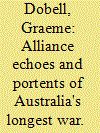

|
|
|
|
|
| Publication |
2014.
|
| Summary/Abstract |
Afghanistan was Australia's longest war, yet the consensus between Australia's major political parties on the commitment never wavered over 12 years. The bipartisan unity held even as the nature of the war changed and evolved, Australian casualties rose and popular support fell away. The enduring centrality of the US alliance explains much-probably almost all you need to know-about the unbroken consensus of the Australian polity. Afghanistan was an example of the Australian alliance addiction, similar to Vietnam. As with Vietnam, the Australian military left Afghanistan believing it won its bit of the war, even if the Afghanistan war is judged a disaster. As Australia heads home it finds the USA pivoting in its direction; with all the similarities that can be drawn between Vietnam and Afghanistan, this post-war alliance effect is a huge difference between the two conflicts.
|
|
|
|
|
|
|
|
|
|
|
|
|
|
|
|
| 2 |
ID:
131825
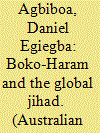

|
|
|
|
|
| Publication |
2014.
|
| Summary/Abstract |
This article critically examines the lethal and growing threat posed by the Nigeria-based Islamist terrorist group Boko Haram or People Committed to the Propagation of the Prophet's Teachings and Jihad. Specifically, the article explores the group's emergence and grievances, as well as its increasing links to the global jihad as spearheaded by al-Qaeda in the Islamic Maghreb and its affiliates like the Somalia-based al-Shabaab. The article then evaluates how the Nigerian state and countries fighting terror abroad, like the USA, have responded to the Boko Haram threat. The conclusion offers some policy prescriptions on how best to respond to Boko Haram.
|
|
|
|
|
|
|
|
|
|
|
|
|
|
|
|
| 3 |
ID:
131822
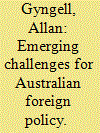

|
|
|
|
|
| Publication |
2014.
|
| Summary/Abstract |
For more than half a century, three broad objectives have formed the core of a bipartisan foreign policy consensus in Australia: support for the US alliance, the development of closer relations with Asia, and integration with a rules-based international order. Until now, we have lived in a world in which Australian governments have found it easy enough to keep all three in alignment. But that is changing. Foreign policy which, in Australia, has traditionally taken second place as a way of thinking about the world to security and defence policy is becoming more important and more complicated.
|
|
|
|
|
|
|
|
|
|
|
|
|
|
|
|
| 4 |
ID:
131829
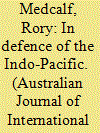

|
|
|
|
|
| Publication |
2014.
|
| Summary/Abstract |
The 2013 Australian Defence White Paper categorically termed Australia's zone of strategic interest the Indo-Pacific, the first time any government has defined its region this way. This raises questions about what the Indo-Pacific means, whether it is a coherent strategic system, the provenance of the concept and its implications for Asian security as well as Australian policy. Indo-Pacific Asia can best be understood as an expansive definition of a maritime super-region centred on South-East Asia, arising principally from the emergence of China and India as outward-looking trading states and strategic actors. It is a strategic system insofar as it involves the intersecting interests of key powers such as China, India and the USA, although the Indo-Pacific subregions will retain their own dynamics too. It suits Australia's two-ocean geography and expanding links with Asia, including India. The concept is, however, not limited to an Australian perspective and increasingly reflects US, Indian, Japanese and Indonesian ways of seeing the region. It also reflects China's expanding interests in the Indian Ocean, suggesting that the Chinese debate may shift towards partial acceptance of Indo-Pacific constructs alongside Asia-Pacific and East Asian ones, despite suspicions about its association with the US rebalance to Asia. Questions about Australia's ability to implement an effective Indo-Pacific strategy must account for force posture, alliance ties and defence diplomacy, as well as constraints on force structure and spending.
|
|
|
|
|
|
|
|
|
|
|
|
|
|
|
|
| 5 |
ID:
131828
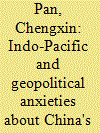

|
|
|
|
|
| Publication |
2014.
|
| Summary/Abstract |
The Indo-Pacific seems to have come of age. In a growing body of literature on this subject, the rise of India and China, as well as the ensuing great-power competition and deepening economic links across the Asia-Pacific and the Indian Ocean regions are often seen as mere (albeit new) geopolitical realities, which the term 'Indo-Pacific' can best capture. This article, however, questions the 'naturalness' of the 'Indo-Pacific' and illustrates how it is largely a product of geopolitical imaginations about the perceived 'rise of China'-imaginations that are shared among some influential observers and practitioners, particularly in the USA, Australia, Japan and India. Fuelled by their collective anxieties about China's growing influence in Asia, the 'Indo-Pacific' is not an innocent or neutral description, but is a manufactured super-region designed to hedge against a perceived Sino-centric regional order. In doing so, it is complicit in the production of great-power rivalries and regional security dilemmas. It is thus important that the 'Indo-Pacific' construct be subject to critical re-examination and re-imagination.
|
|
|
|
|
|
|
|
|
|
|
|
|
|
|
|
| 6 |
ID:
131826


|
|
|
|
|
| Publication |
2014.
|
| Summary/Abstract |
The well-documented failure of many experts to predict many events of strategic importance-from 9/11 to the global financial crisis to the Arab Spring-has led to a fashionable belief amongst some academics and popular commentators that prediction is a 'fool's errand'. Problems inherent in forecasting political events, such as cognitive biases, strategic interaction, complexity effects and various others, make this an attractive position. However, although a proper degree of humility is warranted about the ability to predict strategic events, this article argues that not making predictions at all is not an option. No genuinely workable policy advice could flow to Australian policy makers unless analysts are able, however roughly, to try to forecast the future. Moreover, with some hard, determined work, social scientists have recently produced work which promises to be able to foresee important events such as state failures and civil wars with reasonable accuracy. Experts should be encouraged to make, and should routinely be evaluated on, predictions about their area of expertise. Even failed predictions can be useful in pointing up gaps in knowledge and understanding which would otherwise have remained opaque.
|
|
|
|
|
|
|
|
|
|
|
|
|
|
|
|
| 7 |
ID:
131824


|
|
|
|
|
| Publication |
2014.
|
| Summary/Abstract |
Bob Carr's memoirs were greeted with a mixture of derision and anger. The former seemed justified, given the obsession with airline service and protein-rich meals, although it is hard to know whether he was deliberately sending himself up. The latter concentrated almost entirely on his views on Israel, and his claim that the pro-Israeli lobby determines Australian policies towards the Middle East. The subeditors at the Australia were predictably outraged; Michael Danby's (2014) rather incoherent critique was headlined 'Throwing the Jews under the Bus Won't Help Drive the Labor Party into Power', while Nick Cater's (2014) column, which barely referred to the book, was introduced by the phrase: 'Bob Carr's claim of a falafel faction has fired up the Fuhrer-fawning fringe'.
|
|
|
|
|
|
|
|
|
|
|
|
|
|
|
|
| 8 |
ID:
131827
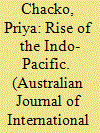

|
|
|
|
|
| Publication |
2014.
|
| Summary/Abstract |
In 2011, the concept of the Indo-Pacific began to appear in India's foreign policy discourse. This article argues that rather than signalling a dramatic shift in India's foreign policy, however, the way in which the Indo-Pacific has been interpreted by the Indian leadership suggests significant continuity as well as change, which is contrary to the goals of the concept's most fervent proponents in India. The article seeks to develop a framework for understanding ideational change and continuity in foreign policy by theorising the interplay between ideas, political and economic flux, and social expectations related to effective and legitimate state-building. It is argued that the Indo-Pacific concept has instigated a new emphasis on regional architecture-building to manage the ongoing regionalisation in the area between the Indian and Pacific Oceans as a result of heightened trade flows and production and investment linkages. Yet, the Indo-Pacific concept, like the new policy ideas on regional engagement that preceded it-the Look East policy and the 'extended neighbourhood'-has been articulated in ways that are also compatible with long-standing ideas-such as non-alignment-about what constitutes appropriate international behaviour. This reflects the nature of the broader state project that has emerged since 1990, which, while encompassing a new focus on economic growth and competitiveness as being essential to effective state-building, continues to prioritise older ideas about what constitutes effective and legitimate state-building.
|
|
|
|
|
|
|
|
|
|
|
|
|
|
|
|
|
|
|
|
|